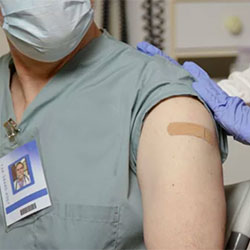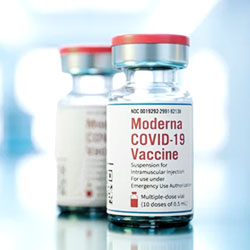Originally published by our sister publication Infectious Disease Special Edition
By Ethan Covey
Two COVID-19 vaccination reporting requirements have been removed by the Centers for Medicare & Medicaid Services (CMS) in its final rule regarding Medicare payment policies and rates for the Inpatient Rehabilitation Facility (IRF) Prospective Payment System and the IRF Quality Reporting Program (QRP) for fiscal year (FY) 2026.

Starting in FY 2026, reporting of COVID-19 vaccination coverage among healthcare personnel will no longer be required, and reporting of this measure will not count toward compliance or lead to payment reductions for FY?2026, CMS said.
According to CMS estimates, removing this requirement will significantly reduce provider burden, saving approximately 13,992 hours across all IRFs and resulting in financial savings of around $503,992 annually.
In addition, reporting the percentage of patients and/or residents who are up to date on COVID-19 vaccination will become optional starting on Oct. 1, 2025, and will be fully removed from the IRF QRP by FY?2028.
This, CMS officials said, will result in a reduction of approximately 3,111.5 hours and $218,116 per year across all IRFs.
For both requirements, CMS has stated the costs associated with the measures now outweigh the benefits, due to issues such as the decreased effects of COVID-19 and the end of the federal public health emergency relating to the COVID-19 pandemic.
According to the National Association of Rehabilitation Providers and Agencies, the removal of the two requirements will ease the administrative burden associated with this data collection and allow IRFs to turn their efforts toward broader quality improvement initiatives.
However, some experts fear that the changes may result in issues, such as a reduction in transparency, loss of potentially useful data and missed opportunities to reduce the facility’s disease burden.
“One of the consequences will be that fewer healthcare workers will accept the COVID-19 vaccine this fall, and that will be both to their personal detriment and somewhat to that of their patients, as they may transmit infections to those for whom they are caring,” William Schaffner, MD, a professor of preventive medicine in the Department of Health Policy and a professor of medicine in the Division of Infectious Diseases at Vanderbilt University Medical Center, in Nashville, Tenn., told Infectious Disease Special Edition.
“It’s a universal conclusion that [COVID-19] vaccines have been a boon in helping us mitigate the very serious impact of the COVID-19 pandemic—they have saved millions of lives and prevented millions more hospitalizations,” Dr. Schaffner said. “I continue to believe that every healthcare worker should receive both the influenza and COVID-19 vaccine each year.”




